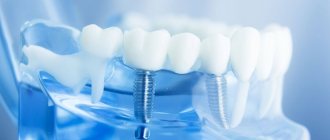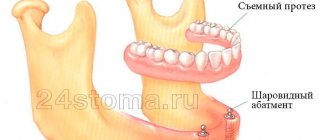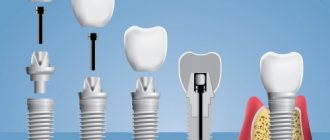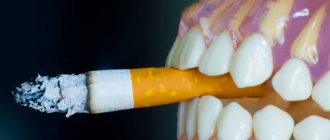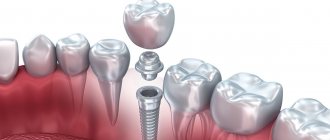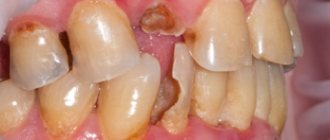Patients usually prepare for dental implantation in advance, weighing the pros and cons, trying to choose a clinic and specialist in advance. But you need to choose an implantation system; difficulties arise. The variety of types of implants, manufacturers and price range makes you seriously think about what dental implants are best to choose?
The doctor will be able to say exactly which implantation system will be optimal in a given clinical case after examination and comprehensive diagnostics. After all, dental implants have different shapes, designs, surfaces, and are used for different indications and treatment protocols.
Moscow dentists use implants from different manufacturers. There are more than a hundred companies in the world producing implant systems and suprastructures for them. Based on price, they are divided into 3 main classes - premium, medium and economy. The choice is based on the reliability of the designs, price, survival rate, manufacturer’s and clinic’s warranty.
Features of the Bicon implant
Any implant system has certain features and differences. The characteristic features that distinguish Bicon implants from similar products include the following:
- The length of Bicon titanium rods is no more than 8 millimeters, while products from other manufacturers are twice as long;
- the area of the implants is approximately three times larger in comparison with analogues due to the increased width of the rod, which ensures their correspondingly higher resistance to external loads and their reliable fastening in the jaw with a short screw length;
- good survival rate is ensured by excellent biocompatibility with bone tissue and high quality titanium alloy;
- due to the small size of Baikon implants, they minimize the risk of damage to bone tissue and gums;
- fixing the system is quite simple; when installing them, there is no need to use special tools or cut tissue;
- There are no fasteners or screws in the mouth, which makes oral care easier and improves hygiene.
Due to their small size, Bicon systems, in comparison with analogues, are distinguished by much higher reliability, stability and stability.
Differences and advantages
The size of the denture is only 8 mm, which guarantees excellent survival even with a small alveolar. The implant has an increased area compared to products from other companies. This provides good stability and the ability to withstand high loads. Due to the fact that the dentures are generally small, bone and gum tissue are minimally injured during prosthetics.
During the installation of a denture, high-quality integration of the rod with the bone is achieved. To implant Beacons, you do not need to make incisions in the tissue: implantation is carried out using a puncture. The risk of rejection is quite low, since the prosthesis shaft is made of high-quality titanium alloy. Oral hygiene after prosthetics does not cause difficulties due to the fact that the design does not have screw fastenings.
It may seem that due to the simplicity of the design, Bicon implants are not functional enough, but this is not the case. Small products are physiological, easy to install, durable and reliable.
Advantages of the brand that dentists highlight:
- the ability to perform prosthetics in a short time;
- implantation without sinus lifting and bone tissue augmentation;
- short recovery period;
- no complications;
- modern design, functionality and durability of prostheses;
- the possibility of installing a prosthesis immediately after implantation of the structure;
- minimal damage to bone and gum tissue;
- the possibility of prosthetics in 1 or 2 stages, including in atrophied or injured tissue, after a previous illness and with periodontal disease;
- ease of implantation immediately after removal of a diseased tooth;
- no gaps or fastenings where germs can get in;
- safety and absolute biocompatibility of implants;
- lifetime warranty.
If there is not enough space in the dentition to install the prosthesis on the base, you can cover the surface of the product with a material that matches the color and texture of the tooth enamel.
Types (models) of Baikon implants
Depending on the diameter, length and connection with the Bicon abutment, implants, the price of which is quite affordable, are divided into three model groups:
- Short series. Rod length 8-11 mm, internal connection 3.0 mm, diameter 4.5-6.0 mm. Such products are the smallest in length. They are designed in the form of a cone-shaped connection, completely immersed in the bone tissue, without touching the alveolar nerves. Prevents bacteria from entering the tooth socket;
- Max 2.5 series. Length 8-11 mm, connection to abutment 2.5 mm, diameter 4-4.5 mm. The model is designed for implantation into the front part of the jaw, but installation in other areas is not excluded. The design has a cone shape. There is the possibility of re-implantation if necessary;
- Narrow series. 8-11 mm – length, 2.0 mm – internal connection, 3-4.5 mm – diameter. Designed for installation on the lower jaw in the front part with a small space between the teeth.
Indications and contraindications
As the manufacturer reports on the official website, Bicon implants are suitable in cases where it is necessary to perform prosthetics as quickly as possible. They are used for standard prosthetics and are suitable for those patients who have an increased risk of complications due to the characteristics of the body.
Using the Baikon system, it is possible to carry out prosthetics without waiting for tissue healing after amputation of a tooth or root. Implants are irreplaceable when the amount of bone tissue is too small to allow the use of products from other manufacturers.
There are no absolute contraindications to the use of Bicon implants. But there are relative cases in which restoration of the dentition is not recommended. These include:
- problematic condition of the oral cavity;
- nervous disorders;
- mental illness;
- diseases that have a viral or infectious etiology;
- caries;
- diseases of the teeth and gums that have developed due to poor oral care;
- chronic pathologies affecting internal organs (the possibility of prosthetics is determined individually);
- impossibility of using anesthetics due to intolerance or medical reasons;
- hypersensitivity to titanium.
Many of the contraindications are removable, so in each case you need to make a decision only after consulting with your dentist.
Advantages of Baikon implants
The main advantage of Bicon brand implants is that there is no need to build up bone tissue when installing them. The titanium root takes root in an extremely short time and remains securely fixed.
The list of advantages of Baikon systems is quite impressive. Among the main ones note:
- compared to conventional dentures, installation of Bicon rods takes much less time;
- The titanium root does not cause any complications after implantation;
- artificial teeth are reliable in operation and visually aesthetically attractive;
- the prosthesis is fixed immediately after its installation and does not cause any discomfort to the patient;
- during the implantation process, the risks of damage to soft tissues are minimal;
- installation can be carried out using a two-stage or one-stage method.
Another advantage that sets Baikon implants apart from analogues is the price, which is much lower than prostheses of other brands. The quality of the implants is highly appreciated by doctors and consumers all over the world. Numerous reviews are direct confirmation of their reliability and impeccability.
Implant installation procedure
The implantation process takes no more than one hour and is carried out under local anesthesia. As a rule, immediately after installing the prosthesis, a fixed restoration is made while the tooth heals, so that the patient will have to experience discomfort during this period due to the absence of a tooth.
Temporary restoration allows, firstly, to preserve aesthetics, and secondly, it completely restores the functionality of the tooth. It reliably stabilizes the implants during healing.
After tooth extraction, a special abutment is installed on it, which promotes rapid healing of the soft tissue around the implant. After 3-6 months, when the tissues have completely healed, the temporary abutment is replaced with a permanent one, and the final restoration is attached to it.
To completely restore a tooth or a full row, just three visits to the dentist are enough. How long the whole process will take can be predicted only after an examination by a dentist. If there is a serious lack of bone tissue, then osteoplasty will have to be done, and the process will take about a year. But thanks to Bicon’s thoughtful solutions, the patient will not experience any discomfort during this period.
Rehabilitation after surgery
The first thing that is necessary after implantation is to follow the doctor’s recommendations and maintain oral hygiene. Immediately after surgery, the patient may experience moderate pain, but this is completely natural. Usually after three days the pain disappears.
In the postoperative period, it is very important to monitor the strength of the fastenings, and if even slight mobility is observed, then you should immediately consult a doctor for more reliable fixation and elimination of defects.
Cost of treatment
Many factors influence the price. How much it will cost a patient to install implants depends on the preparatory work, the current condition of the oral cavity, and the presence of chronic diseases. The total price is also affected by the range of products and medications used. It is also important what pricing policy the chosen dental clinic follows, since the difference in cost can reach several times. Average prices for prosthetics are as follows:
- internal diameter 2 mm - 30,000 rubles;
- ext. d. 2.5 mm - 27,000 rub.;
- ext. d. 3 mm - 20,000 rub.
The price is for 1 element. Thus, the patient can independently calculate the approximate amount required for prosthetics, based on how many products of a particular diameter will be installed.
Patient reviews
The difference between Beacon implants and others is that they are driven in with hammers rather than screwed. That's what the doctor told me. On the one hand, this is good, because there is no screw fastening, which can become loose over time. On the other hand, I had some fears: suddenly something would go wrong. After the tooth was removed, I was immediately fitted with a prosthesis and a temporary abutment, and when everything had healed, a permanent prosthesis was secured. This was a few months ago. The tooth functions normally, there is no feeling that there is something foreign in the mouth.
Antonina, Blagodarny
I recommend this brand of dentures to anyone who decides to get their teeth done. I liked it because at an average price the quality is very decent. 3 years after prosthetics, the implants stand like a glove, not a single tooth has become loose. I'm glad that the color of the coating remained the same as it was originally. There is no discomfort when chewing and you can eat absolutely any food, including hard foods. Of course, I wouldn’t recommend cracking nuts or uncorking bottles - you need to take care of your teeth, whether false or your own.
Sergey, Gavrilov-Yam
When the time came to think about installing dentures, I hesitated for a long time.
It seemed that I could not live with artificial teeth. I went for a consultation with my dentist several times - he is one of those people about whom they say “a doctor from God.” So, he said that it was best to buy Baikon implants, although his wife (on the advice of a friend) insisted on the Snukon brand. I followed the specialist’s advice and did not regret my choice. It’s been 2 years now, no problems yet, and the artificial teeth feel no different from their own. Ivan, Nizhnevartovsk
Materials for the manufacture of implants
In the manufacture of implant systems, metals are used that are resistant to corrosion processes, electrochemical reactions, and biocompatible with periodontal tissues. Such materials include titanium, its alloys, tantalum, and non-metallic materials. The main part of implantation systems is made of titanium. It is a durable, lightweight metal, corrosion-resistant, bioinert, around which bone tissue quickly forms.
Manufacturers use different grades of titanium. Russian manufacturers use purified titanium grades VT 1-0 and VT 1-00 (GOST 19807-91). Foreign companies use 4 grades of titanium (Grade 1−4 ASTM, ISO) and titanium alloy Ti-6Al−4V (ASTM, ISO) - an analogue of the Russian VT-6. The materials differ in mechanical properties and chemical composition.
The purer the material, the higher the rate of survival of the artificial root, its compatibility with nearby tissues, and primary stability in the bone. This factor also minimizes the risk of developing allergies. It is this pure, unalloyed titanium (Grade 4) that premium class implant manufacturers use.
